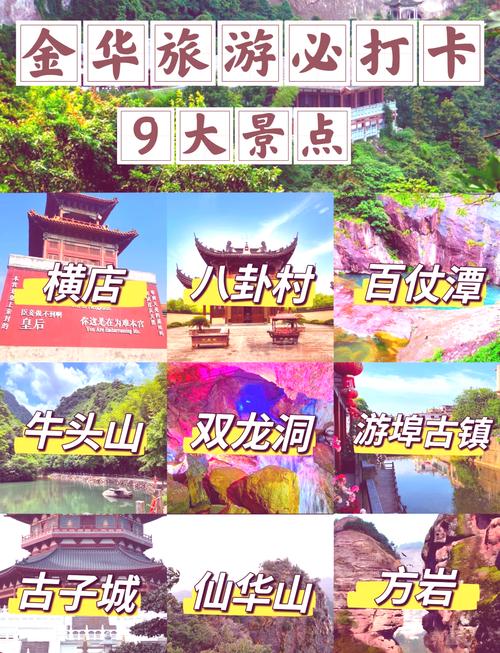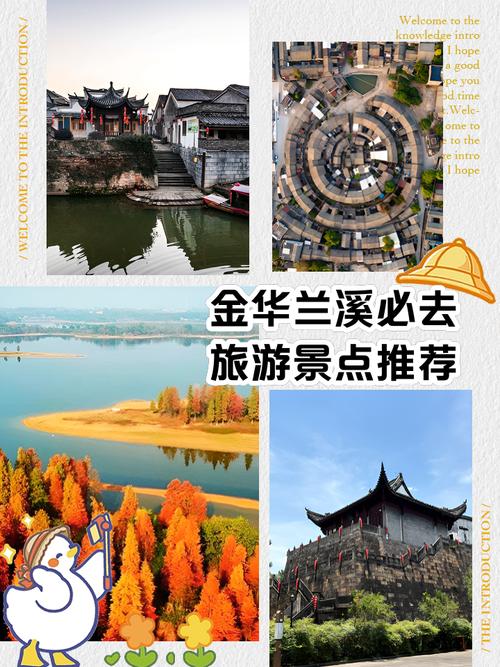金华周边的自驾游选择非常丰富,既有闻名遐迩的世界文化遗产,也有秀美的山水风光和古朴的古镇风情,无论是家庭出游、朋友小聚还是情侣自驾,都能找到心仪的目的地。

(图片来源网络,侵删)
这里为您推荐几个不同类型的热门自驾游路线,您可以根据自己的兴趣和时间来选择:
经典必游类(世界遗产,文化深度游)
这类景点知名度高,文化底蕴深厚,适合第一次来金华周边游玩的朋友。
东阳·横店影视城
- 特色:被誉为“中国好莱坞”,是全球最大的影视拍摄基地,这里有众多仿古建筑群,仿佛穿越到古代。
- 推荐理由:
- 沉浸式体验:可以穿着古装在明清宫苑、秦王宫等场景里拍照,感觉像在拍电影。
- 精彩演艺:每天都有大型的实景演出和精彩的街头表演,非常震撼。
- 亲子互动:很多孩子都喜欢这里,可以体验各种项目。
- 自驾路线:从金华市区出发,沿诸永高速或东永线前往,约1小时车程。
- 游玩建议:
- 时间:至少安排1-2天。
- 门票:景区很大,建议购买“通票”或根据兴趣选择单个景区,可以提前在网上预订,有优惠。
- 住宿:景区内外有大量酒店和民宿,从经济型到豪华型都有,建议提前预订。
兰溪·诸葛八卦村 & 芥子园
- 特色:一个按“九宫八卦”布局的古村落,是三国时期诸葛亮后裔的聚居地,布局精妙,风水独特。
- 推荐理由:
- 建筑奇观:走进村里,仿佛陷入一个巨大的迷宫,非常有趣。
- 文化底蕴:了解诸葛亮的家族文化和“不为良相,便为良医”的家训。
- 毗邻景点:不远处的芥子园是“中国画入门之祖”,园林雅致,适合喜欢传统文化和拍照的朋友。
- 自驾路线:从金华市区出发,走杭金衢高速转游诸线,约40分钟车程。
- 游玩建议:
- 时间:半天到一天。
- 美食:一定要尝尝诸葛村的“八卦宴”,菜品都和八卦、文化相关,很有特色。
山水休闲类(亲近自然,放松身心)
如果你喜欢自然风光,想找个地方放松一下,这几个地方不容错过。
武义·温泉度假村
- 特色:金华的“后花园”,以丰富的温泉资源闻名,被誉为“温泉之城”。
- 推荐理由:
- 养生泡汤:有多种不同功效的温泉池,在寒冷的天气里泡个温泉非常舒服。
- 田园风光:周边有茶园、稻田,空气清新,适合休闲度假。
- 配套完善:有很多高端温泉酒店,集住宿、餐饮、娱乐于一体,可以“一站式”享受。
- 自驾路线:从金华市区出发,走金丽温高速,约30-40分钟车程。
- 游玩建议:
- 时间:1-2天,适合周末或小长假。
- 注意:大部分温泉酒店是“住客专享”或需要单独购票,预订时看清楚包含项目。
浦江·仙华山 & 神丽峡
- 特色:以“奇、险、旷、幽”著称的浙中名山,山色秀丽,云雾缭绕,有“浙西第一仙山”的美誉。
- 推荐理由:
- 登山徒步:风景优美,路线多样,适合不同程度的登山爱好者。
- 摄影胜地:清晨或雨后,山间云海翻腾,是绝佳的摄影地点。
- 毗邻景点:附近的神丽峡峡谷幽深,溪水潺潺,夏天去非常凉快。
- 自驾路线:从金华市区出发,走杭金衢高速转浦江连接线,约1小时车程。
- 游玩建议:
- 时间:一天。
- 装备:穿舒适的登山鞋,带好水和零食。
磐安·浙中大峡谷(夹溪十八涡) & 百杖潭
- 特色:典型的峡谷风光,溪水清澈,瀑布众多,是夏季玩水的绝佳去处。
- 推荐理由:
- 玩水避暑:十八涡的溪水清澈见底,可以踩水、溯溪,非常清凉。
- 视觉冲击:百杖潭的瀑布气势磅礴,落差巨大,非常壮观。
- 空气绝佳:磐安是“浙江之心”,森林覆盖率极高,是名副其实的“天然氧吧”。
- 自驾路线:从金华市区出发,走杭金衢高速转诸永高速,约1.5-2小时车程。
- 游玩建议:
- 时间:一天。
- 季节:夏季最佳,玩水非常过瘾,其他季节可以欣赏峡谷的壮丽景色。
古镇风情类(慢生活,寻味历史)
喜欢安静、想体验江南慢生活的朋友,可以去这些古镇。

(图片来源网络,侵删)
义乌·佛堂古镇
- 特色:义乌的历史文化名镇,曾是浙中重要的水陆码头和商业中心,至今仍保留着浓郁的古镇风貌。
- 推荐理由:
- 原生态:相比过度商业化的古镇,佛堂更加原汁原味,生活气息浓厚。
- 美食天堂:古镇里藏着许多地道小吃,如羊肉、廿三里豆腐、东河肉饼等,可以一路吃到饱。
- 夜景迷人:夜晚的古镇灯火通明,沿着江边散步,非常惬意。
- 自驾路线:从金华市区出发,走金义东高速,约40分钟车程。
- 游玩建议:
- 时间:半天到一天。
- 美食:一定要在古镇里品尝各种小吃,佛堂的羊肉非常有名。
行程规划建议
一日游路线
- 文化探索线:金华市区 → 诸葛八卦村 (游玩3-4小时) → 芥子园 (游玩1-2小时) → 返回金华。
- 山水休闲线:金华市区 → 武义温泉 (泡汤、享用午餐) → 返回金华。(适合放松)
二日游路线
- 影视狂欢线:
- Day 1:前往横店影视城,入住景区酒店,下午游览明清宫苑,晚上看《紫禁大典》实景演出。
- Day 2:上午游览秦王宫或清明上河图,下午返程。
- 山水古韵线:
- Day 1:金华市区 → 磐安百杖潭/浙中大峡谷 (游玩、午餐) → 入住磐安或周边民宿。
- Day 2:上午游览神丽峡或昭明寺,下午返程。
三日游路线
- 全景深度游:
- Day 1:金华市区 → 横店影视城 (游玩一天)。
- Day 2:横店 → 兰溪诸葛八卦村 → 浦江仙华山 (下午登山) → 晚上入住浦江或兰溪。
- Day 3:上午游览佛堂古镇,品尝美食,下午返程。
希望这些推荐能帮助您规划一次完美的金华周边自驾游!祝您旅途愉快!

(图片来源网络,侵删)




